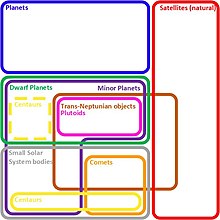
The International Astronomical Union (IAU) defined in August 2006 that, in the Solar System, a planet is a celestial body that:
is in orbit around the Sun,
has sufficient mass to assume hydrostatic equilibrium (a nearly round shape), and
has "cleared the neighbourhood" around its orbit.A non-satellite body fulfilling only the first two of these criteria (such as Pluto, which had hitherto been considered a planet) is classified as a dwarf planet. According to the IAU, "planets and dwarf planets are two distinct classes of objects" – in other words, "dwarf planets" are not planets. A non-satellite...